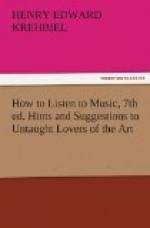The man of science observes the phenomenon and formulates its laws, saying, for instance, as Herbert Spencer has said: “All feelings are muscular stimuli;” and, “Variations of voice are the physiological results of variations of feeling.” It was the recognition of this extraordinary intimacy between the voice and the emotions which brought music all the world over into the service of religion, and provided the phenomenon, which we may still observe if we be but minded to do so, that mere tones have sometimes the sanctity of words, and must as little be changed as ancient hymns and prayers.
[Sidenote: Invention of Italian opera.]
[Sidenote: Musical declamation.]
The end of the sixteenth century saw a coterie of scholars, art-lovers, and amateur musicians in Florence who desired to re-establish the relationship which they knew had once existed between music and the drama. The revival of learning had made the classic tragedy dear to their hearts. They knew that in the olden time tragedy, of which the words only have come down to us, had been musical throughout. In their efforts to bring about an intimacy between dramatic poetry and music they found that nothing could be done with the polite music of their time. It was the period of highest development in ecclesiastical music, and the climax of artificiality. The professional musicians to whom they turned scorned their theories and would not help them; so they fell back on their own resources. They cut the Gordian knot and invented a new style of music, which they fancied was like that used by the ancients in their stage-plays. They abolished polyphony, or contrapuntal music, in everything except their choruses, and created a sort of musical declamation, using variations of pitch and harmonies built up on a simple bass to give emotional life to their words. In choosing their tones they were guided by observation of the vocal inflections produced in speech under stress of feeling, showing thus a recognition of the law which Herbert Spencer formulated two hundred and fifty years later.
[Sidenote: The music of the Florentine reformers.]
[Sidenote: The solo style, harmony, and declamation.]
[Sidenote: Fluent recitatives.]
The music which these men produced and admired sounds to us monotonous in the extreme, for what little melody there is in it is in the choruses, which they failed to emancipate from the ecclesiastical art, and which for that reason were as stiff and inelastic as the music which in their controversies with the musicians they condemned with vigor. Yet within their invention there lay an entirely new world of music. Out of it came the solo style, a song with instrumental accompaniment of a kind unknown to the church composers. Out of it, too, came harmony as an independent factor in music instead of an accident of the simultaneous flow of melodies; and out of it came declamation, which drew its life from the text. The recitatives which they wrote had the fluency of spoken words and were not retarded by melodic forms. The new style did not accomplish what its creators hoped for, but it gave birth to Italian opera and emancipated music in a large measure from the formalism that dominated it so long as it belonged exclusively to the composers for the church.




